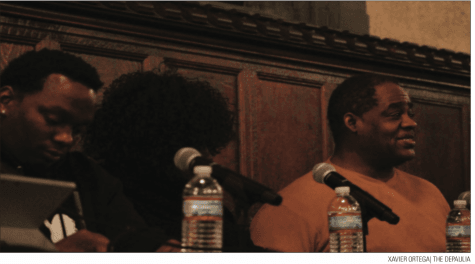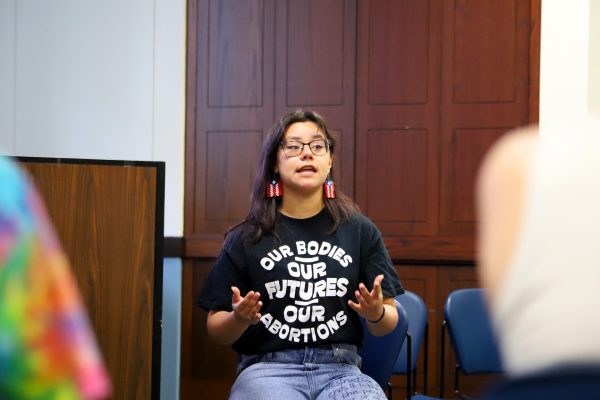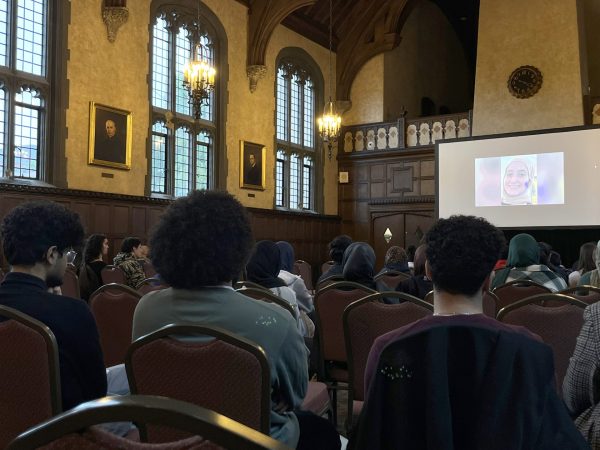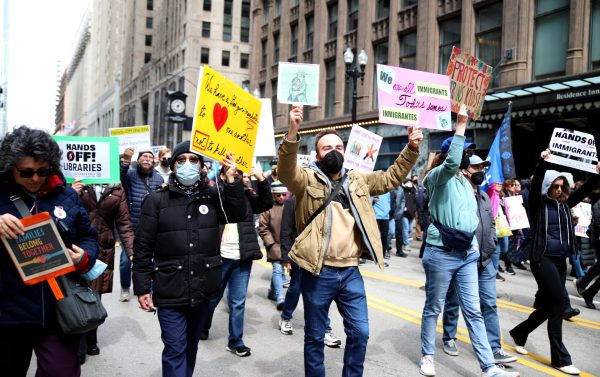Panel on incarcerated labor reveals harsh truths in America
In a discussion held by the Department of African and Black Diaspora Studies and the DePaul University Labor Education, community leaders, professors, and students discussed how the criminal justice system exploits the labor of imprisoned black men in a manner similar to Jim Crow.
Nearly 50 people attended to learn from representatives from the Chicago Workers’ Collaborative, the Workers Center for Racial Justice, and SEIU-HCII. Some of these people were also former prisoners and were able to give their perspective on the subject.
Even though the United States only makes up five percent of the world’s population, it holds almost 25 percent of the world’s jailed population, according to the International Centre for Prison Studies.
With one in four prisoners in the world being American, it’s shocking to learn that 97 percent of those incarcerated in the U.S. have never seen trial, according to the National Association of Criminal Defense Lawyers.

Ninety-seven percent of those incarcerated have not seen a trial because they chose to take plea bargain deals. With bail being expensive, and a trial guilty decision being much worse than a plea deal, it explains why so many will decide to take a plea deal instead of going through a trial.
This is also why an innocent person would plea guilty to take the deal. When it comes to serving three years in prison or possibly serving 30, the answer is easy.
The 13th amendment says slavery is illegal, “except as a punishment for crime.”
Barry Rose, of the Chicago Workers’ Collaborative, said when he was serving time in prison, he would make $14 a month. After paying fees that covered his expenses in jail, Rose said he was making pennies an hour.
Rose said industry jobs, like manufacturing mattresses and shirts, would pay $180 a month. These goods are then sold to the public and are well known brands such as Victoria’s Secret, JCPenney and Starbucks.
These companies save money by contracting prisons. The Netflix documentary “13th” says “corporations are operating in prisons and profiting from punishment.”
Rose said it is very difficult for a person with a criminal history to find employment after returning home. Employment through a temp-agency is the most likely option for anyone trying to find work. These agencies are supposed to give jobs to workers who had worked for 90 days.
According to Rose, “temp jobs are a false promise. Temp jobs can get away with not paying benefits or overtime” and many do not disclose rights to their employees. Employees are working dangerous jobs without proper training and have gotten injured and lost limbs.
“If I could have a job while in prison, why can’t I find one outside of it?” Rose asked.
The Chicago Workers’ Collaborative is a local group that takes care of temp-workers and makes sure they know their rights.
“What keeps you from coming back to jail is employment,” said Antonio Lightfoot, who works with the Workers Center for Racial Justice.
Lightfoot says life after jail is still a form of punishment, those who have a criminal history face a legal form of Jim Crow.
The Netflix documentary “13th” says those with criminal histories face discrimination when it comes to employment, housing, student loans, business licenses, and food stamps.
“Prison is viewed as a way to pay your debt to society, but you come out with an ‘X’ on your back. The sort of debt that you had, is never fully paid,” Lightfoot said.
Jacquie Algee, the vice president of a SEIU-HCII, also attended the discussion. Algee discussed the challenges that the family faces when a loved one is in jail.
“Communities and families suffer when someone is incarcerated, some can’t even live with their families due to housing policies when it comes to felons,” he said.
Rose recalled when he couldn’t even live with his family after he returned from prison and had to live in a halfway house instead.
Lightfoot said one of the ways to make employment more accessible was by “banning the box.” The box he refers to is the question on job applications that ask if the applicant is a felon. Lightfoot says the box does not need to be there by state law anymore, yet employees still continue to ask.
SAI welcomes students to learn more about the new Jim Crow. SAI has a facebook page and a page on Orgsync.com. SAI can also be contacted through their email at al_boutros@hotmail.com.






